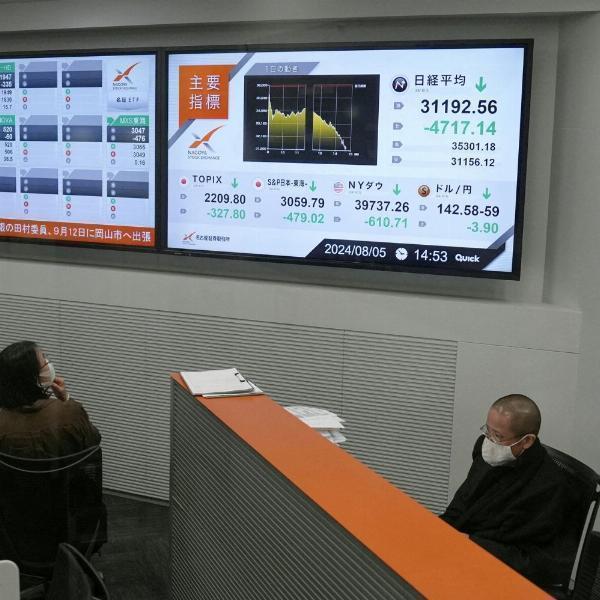Japan’s Stock Market Plunges into Bear Territory as Asian Markets Extend Losses

Strong 8k brings an ultra-HD IPTV experience to your living room and your pocket.
Japan’s Stock Market Plunges into Bear Territory as Asian Markets Extend Losses
Category: News
Japan's Stock Market Hits Bearish Low Amid Asian Market Turmoil | Mr. Business Magazine
(Source – Reuters)
Japan’s Market Decline
Japan’s stock market confirmed a bear market status on Monday, with key indices, the Nikkei 225 and Topix, experiencing a dramatic decline of over 10%. This drop marks a more than 20% fall from their peak values reached on July 11, highlighting the intensified sell-off across Asia-Pacific markets that began last week. Prominent trading houses, including Mitsubishi, Mitsui & Co, Sumitomo, and Marubeni, each suffered a drop of about 10%, underscoring the widespread market distress.
Monday’s downturn follows Friday’s sharp decline, where the Nikkei 225 fell over 5% and the Topix plunged more than 6%. The broader Topix experienced its worst day in eight years, while the Nikkei recorded its steepest decline since March 2020. In currency markets, the Japanese yen strengthened against the US dollar, reaching its highest level since January, trading at 143.40. Investors are now focused on upcoming trade data releases from China and Taiwan, as well as monetary policy decisions from central banks in Australia and India.
Regional Market Impacts
The ripple effects of Japan’s stock market downturn were felt across Asia, with several major indices experiencing significant losses. Taiwan’s benchmark index, the Taiwan Weighted Index, dropped nearly 8%, while Australia’s S&P/ASX 200 declined by 3.05%. South Korea’s Kospi and Kosdaq indices fell by 6.66% and 6.78%, respectively. Despite these substantial losses, Hong Kong’s Hang Seng Index saw a comparatively smaller decrease of 0.22%. Meanwhile, mainland China’s CSI 300 was the only major index in the region to remain in positive territory, with a modest gain of 0.24%.
The financial markets are closely watching the Reserve Bank of Australia’s (RBA) two-day monetary policy meeting, which began on Monday. Economists surveyed by Reuters anticipate that the RBA will maintain its interest rates at 4.35%. However, market participants are keenly interested in the RBA’s monetary policy statement for insights into whether the central bank is still contemplating a rate hike.
Global Economic Concerns
The sell-off in Asian markets echoes the volatility seen in the United States, where stocks faced significant declines following a disappointing jobs report for July, raising concerns about a potential recession. On Friday, the Nasdaq Composite became the first of the three major US benchmarks to enter correction territory, having fallen more than 10% from its record high. The S&P 500 and Dow Jones Industrial Average were also down, by 5.7% and 3.9% from their all-time highs, respectively.
The S&P 500 dropped 1.84%, while the Nasdaq Composite lost 2.43%. The Dow Jones Industrial Average fell by 610.71 points, equivalent to a 1.51% decline. The unexpectedly weak US jobs data has heightened fears of an economic slowdown, leading to increased volatility in global financial markets.
As investors grapple with these developments, the focus is on the economic indicators and policy decisions from major economies, which could provide clarity on the direction of global markets. The ongoing uncertainty underscores the challenges facing investors as they navigate a complex economic landscape marked by fluctuating market conditions and evolving policy dynamics.
Conclusion
The recent plunge in Japan’s stock market, confirming a bear market status, reflects the broader uncertainty and volatility across global financial markets. The dramatic declines in the Nikkei 225 and Topix indices, alongside significant losses in other Asian markets, highlight the widespread economic concerns fueled by weak economic data and cautious investor sentiment. As markets continue to react to disappointing employment figures from the U.S. and anticipate upcoming trade data and central bank decisions, the financial landscape remains precarious. As markets adjust to these challenging conditions, the emphasis on accurate data interpretation and prudent decision-making becomes crucial in guiding future investment strategies.
Curious to learn more? Explore more news on: Mr. Business Magazine
Note: IndiBlogHub features both user-submitted and editorial content. We do not verify third-party contributions. Read our Disclaimer and Privacy Policyfor details.


